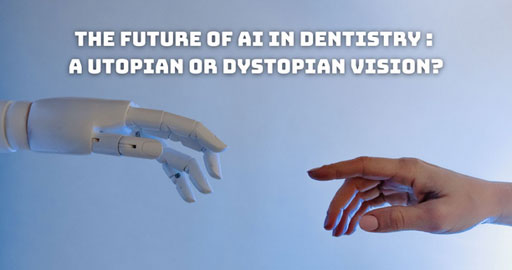
The Future of AI in Dentistry : A Utopian or Dystopian Vision?
Table of Content
In the last years, artificial intelligence has diffused into all walks of life at runaway speed, and the exception is not dentistry. AI will change the dental profession in a way that patient care is improved, smoothing of the processes will increase diagnostic accuracy. But as with all technological developments, there are visions regarding AI in dentistry—utopian and dystopian.
“The integration of AI in dentistry is a game-changing enabler towards better patient care and diagnostic/ treatment precision. Much as challenges may emanate, it is the harmony between technology and human acumen that surely shall take us to a future where oral healthcare scales new heights.” – Lt. Gen. Dr. Vimal Arora
Utopian Vision
The lobbies for AI in dentistry envision a future where patients benefit from fast and highly accurate dental care. Supported diagnostic tools by AI can interpret dental images and history of patients with the most astounding precision, and therefore it will be very easy to recognize abnormalities in the oral cavity, helping in diagnosis for dental caries, periodontal diseases, and even oral cancers at an early stage, which could help save lives besides money spent on highly advanced treatments.
In addition, AI-driven robotic systems are also in the works to assist dentists during complicated procedures, which will be performed with more accuracy and less fatigue. They will be able to work continuously without getting tired and reduce chances of error, thus delivering results. This would in some way mean shorter and more comfortable dental appointments for patients.
Another domain in which AI performs well is in patient education. Virtual and augmented reality applications could provide immersive experiences to patients for better understanding of treatment options, therefore helping to make proper decisions. AI-powered chatbots and virtual assistants answer questions from the patients and provide post-treatment guidance to improve overall patient satisfaction and compliance with dental care recommendations.
Also, other innovations like smile simulation tools, such as ClinCheck, are changing the face of AI in orthodontics. Powered by AI-driven solutions, patients are in a better position to see the progression of their orthodontic treatments and hence engage them while satisfaction is built across their orthodontic journey.
AI-enabled dental chairs, epitomized by solutions such as DORI, pave the way to a safe and sanitary dental setup. DORI sterilizes the dental chair independently after every use, thus providing protection against cross-infection and allowing patients to be treated in a clean and sterile environment.
On top of these developments, AI has taken center stage in improving the decision-making processes involved in dentistry. Thus, artificially intelligent devices can very quickly process diagnostic images, be they X-rays or 3D scans, to highlight potential problems that might not be immediately evident to the naked human eye. This kind of technology makes for quicker diagnosis and more timely treatment that could really improve patient outcomes.
The Dystopian Vision
There are, however, concerns regarding the extent of AI integration within dentistry. Privacy becomes an issue on its own in that the data of patients is even more vulnerable. If AI is going to be useful, it will require vast patient information; therefore, questions will arise on how secure that data can and will be, and whether appropriate patient consent will be obtained.
Yet another concern of this dystopian view of reality is an overreliance on AI. The dentist may start relying too heavily on the algorithm that it loses these essential diagnostic skills and clinical judgment. Not only that, but the implementation cost of AI technology could be prohibitively high for smaller dental practices, possibly further exacerbating healthcare disparities.
There is yet another fear: AI can displace jobs among dental professionals. Much as it can support dentists in most tasks, it cannot, on any account, replace the human touch and empathy so needed at every stage of patient care. Striking a balance between automation and human interaction will be foremost to avoid dehumanizing the dental experience.
Finding a Balance
It doesn’t necessarily need to be a utopian or dystopian future for AI in dentistry. Instead, it could be one where technology and expertise will blend harmoniously. Dentists could use AI as a very important tool that prolongs ability, not replaces it. Using AI in routine activities like image analysis and administrative tasks, the dentist can be free to focus on more challenging issues and on the individuals of the patients.
Of course, robust measures for the protection of data and clear regulations concerning their use need to be in place. It is equally important to ensure that patients can form control over their personal data and be well-informed on how it will be used. In terms of this point, transparency and ethical AI development will become crucial in establishing trust with patients.
Leave a Reply
Leave a Reply
Explore More Similar Posts
Explore More Blogs


Leave a Reply